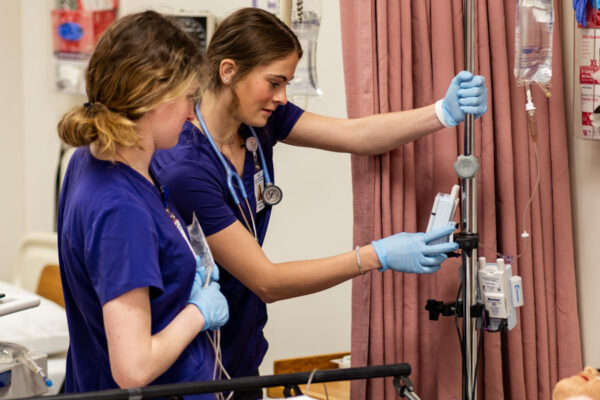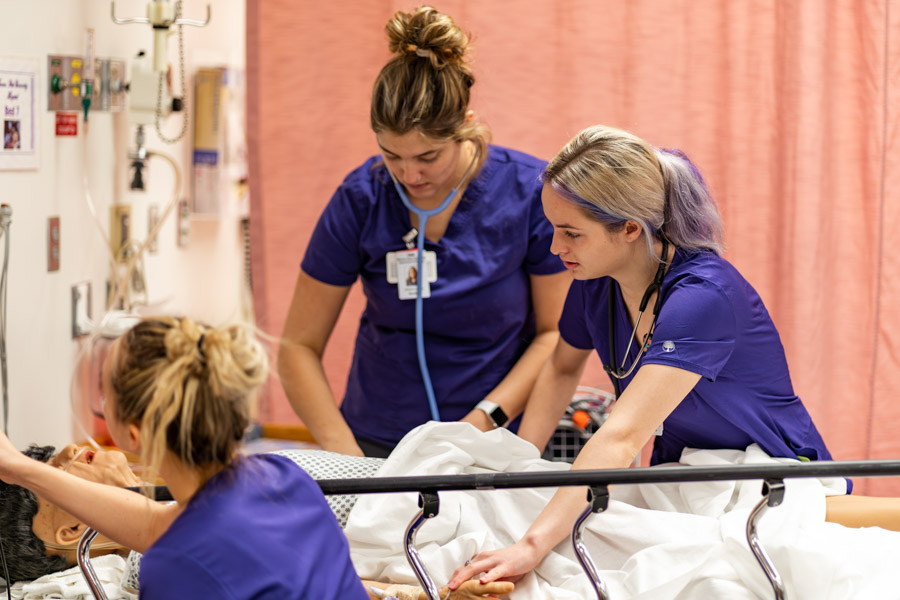
Nursing
Bachelor's
PROGRAM SNAPSHOT
Serve communities in need. Focus on the people in your care and build relationships with them. Become an inclusive leader in nursing.
When you aren’t feeling well or have a minor injury, a Registered Nurse (RN) is likely the first face you’ll see.
RNs provide patient care and coordinate patient plans. They work closely with physicians and other healthcare professionals to do this.
Registered Nurses also teach patients and the public how to manage certain health conditions. They work in clinics, hospitals, schools, nursing homes, and other facilities.
The wide range of RN specialties offer many career possibilities:
- Support people recovering from surgery
- Run immunization clinics and blood drives
- Closely monitor people with serious and complex conditions
- Take care of newborn babies, cancer patients, and the elderly
- Help patients overcome mental health concerns, substance abuse, and addictions
- Work with patients who have disabilities, chronic illnesses, genetic disorders, and other health issues
The demand for passionate care providers has never been greater. Become a Registered Nurse with the Nursing major through WSU’s Department of Undergraduate Nursing.
The Nursing major is meant for anyone who doesn’t have previous nursing education or a nursing license. This program is accredited by the Commission on Collegiate Nursing Education (CCNE).
As a Nursing Major, you’ll strengthen your skills in communication, critical thinking, prioritization, and evidence-based practice.
You’ll also gain experience in multiple models of practice, including:
- traditional clinical model—provide direct patient care in a clinical setting with faculty supervision.
- Dedicated Education Unit (DEU) model—learn firsthand what nursing is all about from trained Registered Nurses.
- preceptor model of clinical education—provide direct patient care in a clinical setting and be supervised by an RN selected by your Nursing faculty.
This program comprises 4 terms. Think of terms as milestones in knowledge and understanding. Each term features important concepts applicable to all nursing specialties.
Pharmacology
Pathophysiology
Leadership skills
Medical-surgical concepts
RN-level skills and assessments
Caring for older adults
Research fundamentals
Evidence-based practice
Psychosocial aspects of nursing
Pediatrics
Labor and delivery
Community-based health care
High acuity situations in nursing
Hospice care
Transition to practice
Complex care situations
Public health foundations
Mental health fundamentals
You’ll also complete extensive group assignments and projects.
Your coursework is designed to train you to effectively work in teams and resolve conflicts.
Aside from major- or minor-specific requirements, you’ll need to complete additional requirements through the General Education Program (GEP) to earn your degree from Winona State University.
Learn More about the GEP

Megan, who moved from the Philippines to Minnesota at age 6, earned her Nursing degree from Winona State.
Thanks to supportive professors and clinical experiences at Mayo Clinic, she’s now starting her dream job in pediatric mental health after graduation.
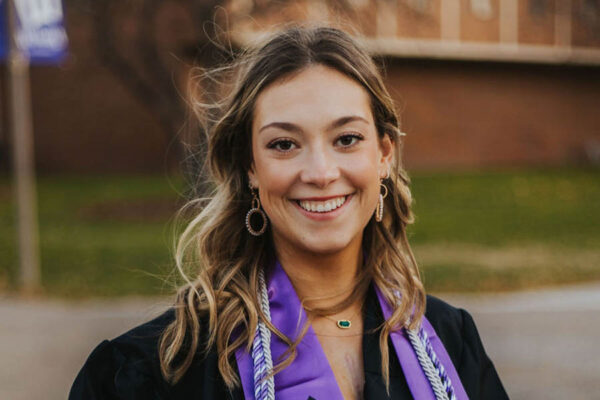
While studying Nursing at Winona State, Aubrey faced a life-threatening heart infection that required emergency surgery.
With unwavering support from her professors and classmates, she returned to school, completed her studies, and is now ready to care for others in the ICU.

Despite the challenges of entering the Nursing program during a pandemic, Josephine thrived at Winona State.
WSU’s resources and her connections helped her grow into a confident nurse ready to serve in Hawaii—and plan for a future Doctorate of Nursing Practice degree.
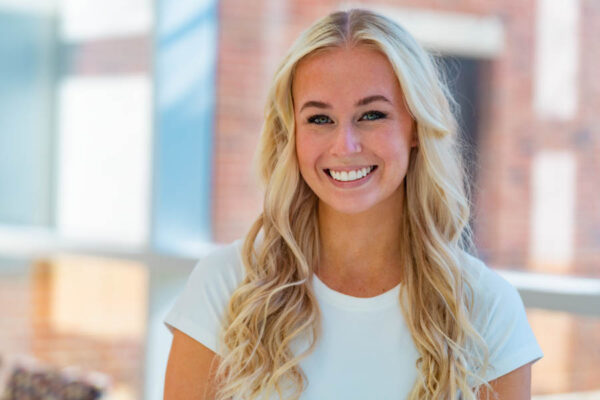
Greta earned her Nursing degree from Winona State, facing the unique challenges of the pandemic head-on.
She credits her professors and the close-knit campus community for helping her stay strong and focused on her goals.

At Winona State, Collen found a community that helped him manage stress and succeed in his Nursing studies.
He cherished moments of reflection atop Garvin Heights, overlooking the city and campus.

Despite balancing Nursing school and caring for her newborn, Zeinab persevered like a Warrior.
Winona State’s compassionate faculty provided the flexibility and encouragement she needed to succeed.
Real-World Training
You’ll complete nearly 550 clinical hours as a Nursing major. This includes a 120-hour immersion experience when you’ll be paired with a Registered Nurse in a practice setting.
These clinicals will let you get hands-on practice in a variety of specialties, like acute care, community health, hospice care, labor and delivery, mental health, older adults, pediatrics, and public health.
WSU has a broad array of clinical partnerships in Winona, La Crosse, Rochester, and the Twin Cities. You could find yourself at Mayo Clinic, Gundersen Health System, Winona Health, or Bridges Health.
Or you can explore clinical opportunities outside the region, such as a clinical exchange experience in Sweden.
The NCLEX is the premier nurse licensure exam. You must pass this exam to qualify for entry-level RN positions and to provide safe and effective care.
This program integrates case studies, lessons, and targeted quizzes inside and outside the classroom. These study aids combine to offer a solid foundation for NCLEX preparation.
Be one step closer to becoming an RN by getting the real-world preparation you need along with your degree.
The Nursing program curriculum prepares you to apply for a Public Health Nurse (PHN) certification through the Minnesota Board of Nursing. This certification will help you meet the needs of our changing healthcare landscape.
You’ll also be ready to apply for a School Nurse license through the Minnesota Professional Educator Licensing & Standards Board.
Beyond the Classroom
Healthcare settings are always seeking ways to improve their patient outcomes.
That’s why your courses will teach you how to research an area of interest and use what you learn as evidence in your practice.
You can expand on your research from class and further hone your skills by pursuing a faculty-guided Honors Project.
You could find yourself researching nurse burnout, COVID-specific interventions, postpartum depression, or diversity in nursing education.
Apply what you learn in the classroom by traveling the world. At WSU, you can earn credit that counts toward your degree while exploring the globe.
Learn about the business of health care in Paris, child welfare systems in Jamaica, and leadership and team development in New Zealand.
Or dive into health promotion in Peru, service learning in India, and other programs in England, Ireland, Austria, and beyond.
Complement your studies and meet other students who are passionate about nursing and health care through a handful of campus clubs and organizations.
Like Active Minds, Colleges Against Cancer, HOPE Club, Junior Nursing Club, and Minnesota Student Nurses Association.
Or Senior Nursing Club, Student Health & Wellness Advocates, Warriors for Kids’ Health, Warriors for Life, and Winona State Nursing Club.
The WSU Nursing Simulation Lab allows students to practice care for a wide range of patient types in a safe and controlled environment.
This space features several sophisticated and life-like manikins—from newborn, infant, and child to adult and a birthing mom.
We’ve also partnered with Winona Health to offer an additional simulation space for Nursing students.
Program Admission & Advising
There are 2 ways to be admitted to the Nursing major.
Direct Admission guarantees acceptance to this program for students who earned exceptional ACT/SAT scores and excellent college grades.
If you aren’t the best test taker, don’t worry. We’ll consider your personal achievements in nursing, volunteer and community service experiences, and GPA through Holistic Admission.
Most applicants for this program apply through Holistic Admission.
Personalized Advising
You’ll receive individualized student advising services and other support every semester from your first year through graduation.
There’s also a nursing student success-focused advisor who’s ready to guide you through your educational journey and answer your questions along the way. Schedule an appointment today.
According to the Bureau of Labor Statistics, Registered Nurses are within the top 20 professions with the highest expected number of new jobs until 2031.
Your bachelor’s degree in Nursing will also prepare you for graduate school. Become an Advanced Practice Registered Nurse (APRN) to level up in your career. APRN professions like nurse anesthetists, nurse midwives, and nurse practitioners are predicted to grow by 40% in the next decade.
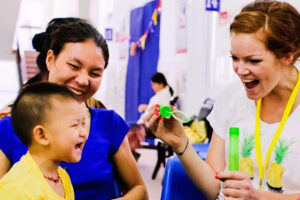
Bachelor's
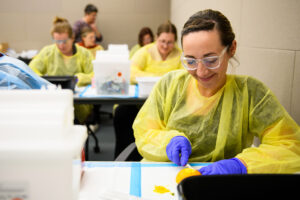
Bachelor's
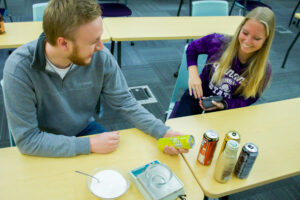
Bachelor's
